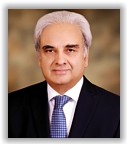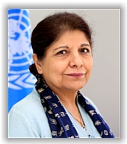 |
|

President of Pakistan
Mr. Mamnoon Hussain
|
It gives me immense pleasure to congratulate State Bank of Pakistan (SBP) on this auspicious occasion of its 70th anniversary. The establishment of the country’s central bank by Quaid-e-Azam Muhammad Ali Jinnah on 1st July 1948-soon after freedom-was a key milestone in nation building. It ensured independence in monetary affairs and signaled the commencement of the financial and banking infrastructure development in the country. The newly born nation’s confidence and the stature of the country rose to new heights as SBP started issuing sovereign currency.
By virtue of its visionary leadership and dedicated efforts, SBP has become a symbol of institutional strength and pride for the country. Since its inception, SBP has played a critical role in the economic development of the country by strengthening the financial system and fostering macroeconomic stability. In 70 years of its life, SBP has faced a wide range of challenges, arising both on the global and domestic fronts. It has sailed successfully through these obstacles thereby proving its strength and achieving the trust of the public.
The history of economic development reveals that, among other factors, strong and efficient institutions are pivotal in determining the success of states across the globe. SBP, being one of the fundamental institutions of the state, has achieved a level of efficiency and strength that has been recognized globally. It has been effective in implementing its statutory mandate by formulating and conducting monetary, regulatory and supervisory policies in the best interest of the country. By safeguarding financial system’s stability, enhancing financial services, and being vigilant to the entrusted role, the SBP has demonstrated its effectiveness as a quality institution. Moreover, as the role of institutions is becoming more challenging than ever in an increasingly complex, integrated, and information-rich world, SBP remains adaptive to dealing with the changing realities through aligning it with international best practices.
I am confident that SBP would continue to be a dynamic institution delivering high quality services, acting as a knowledge institution, and retaining the trust of public. I hope that the higher level of integrity standards set by SBP would continue to define its identity in future.
I wish all the success to the State Bank in its future endeavors.
|
|
|
|

Prime Minister of Pakistan
Justice (Retd) Nasir-ul-Mulk
|
State Bank of Pakistan, since its inception, has been making relentless efforts for the development of the country's economy. Being the custodian of monetary and financial stability, State Bank of Pakistan has steadily transformed and strengthened itself over the years to adopt modern approaches and international best practices in all principal areas of its policy mandate and operations.
Serving its legal mandate of achieving monetary stability, State Bank’s monetary policy has been helping to contain inflation and support economic growth in Pakistan. This policy stance has not only been conducive for increasing the purchasing power of the common people, but has also been providing relief to marginalized segments of the society. Over the last three decades, the Bank has implemented substantive changes in the formulation, management and conduct of its core function of monetary policy. Importantly, in line with the international best practices, the establishment of an independent Monetary Policy Committee has enhanced the independence, transparency and credibility of the monetary policy formulation process.
Similarly, in the modern world, the global financial crisis of 2007-08 reminded us that the stability and buoyancy of the banking system is of critical importance for a country’s sustainable economic development. Over the years, State Bank’s continuous improvements in its prudential regulations in line with the international regulatory framework have significantly improved the resilience of the banking system of Pakistan. In addition, the development of Islamic banking in parallel with conventional banking is providing financial services to a large segment of our population on a competitive basis.
It is encouraging to note that the Bank is following a well-thought-out strategy to preserve macroeconomic stability, facilitate the provision of financial services, and ensure higher standards of living for the common people of Pakistan under its Vision 2020. Successful execution of this strategic plan will undoubtedly enable the State Bank to further its mission of achieving sustained and equitable economic growth and prosperity in Pakistan.
|
|
|
| |
|
|

Minister for Finance, Revenue and Economic Affairs
Dr. Shamshad Akhtar
|
It’s a proud momentum for all of us to celebrate 70 years of the State Bank of Pakistan (SBP). Our central bank is a premier and prestigious institution of the country. Backed by a series of legislative reforms and implementation of a comprehensive, phased, program of modernization and capacity building, the central bank has undergone substantial transformation under progressive regimes. Recent amendments in SBP's Act, have well positioned the SBP to deliver on its core mandate of monetary and credit policy management keeping an eye on price and financial stability.
To its credit, SBP has incrementally strengthened its capacities as banking regulator supporting what since 1990s is essentially a private banking industry. Like other central banks, SBP has been working with the Government to promote development finance to ensure improved access to banks through a combination of policies ranging from enhancement of financial inclusion (through promotion of microfinance industry and branchless banking) to the provision of priority credit, among others, for exports. In this context, SBP has further nurtured Islamic Finance industry backed by Shariah compliant regulatory and supervision system.
Central bank’s success in containing inflation however, is critically linked to coherent and reinforcing monetary and fiscal policies - an area where there remains scope for better coordination between central bank and government. More significantly, SBP’s achievements depend on political commitment and leadership and effective implementation of economic policy management and structural reforms.
Lack of effective domestic resource mobilization has, for long, forced successive governments to continue its recourse to central bank and commercial bank resources resulting in crowding out private credit and distorting financial intermediation process. Concurrently, Pakistan’s low savings culture is constraining its capacity to promote sustainable investment. Structural problems of economy expose the country to internal and external vulnerabilities that have impacted its ability to rein in fiscal deficits that in turn have complicated monetary management and its outcome. Continued endeavors of policy makers to embrace high quality economic management and coordination is critical for efficacy and credibility of all institutions but most of all for the economic stability of the country.
To the credit of successive central bank governors, SBP has invested substantially in strengthening its staff’s analytical, research and policy implementation capacities. Among others, SBP’s strategic move towards adoption of Flexible Inflation Targeting (FIT) monetary policy regime is notable and calls for pursuance of sustainable macroeconomic path. This calls for Government and SBP to work as a team to move coherently on effective interest rate and exchange rate management, while pushing for formalization of the undocumented economy. Sound and coordinated monetary, fiscal and financial policies are critical to ensure we promote a conducive business environment backed by well calibrated industrial, trade, and exchange policies. This is crucial for unlocking an economy’s growth potential and hence I underscore enhanced institutional cooperation across policy makers and agencies for achieving goals of economic prosperity and development.
|
|
|
|

Governor State Bank of Pakistan
Mr. Tariq Bajwa
|
The State Bank of Pakistan (SBP) has the mandate to “regulate the monetary and credit system of Pakistan and to foster growth in the best national interest with a view to securing monetary stability and fuller utilization of the country’s productive resources”.
In addition to its central role in the Monetary Policy of the country, and being the regulator of the banking sector SBP is also pursuing a developmental role by improving access of marginalized segments and sectors of the society to financial services. To this end, SBP has prioritized the promotion of Islamic banking and is facilitating the extension of credit to agriculture, SME, and housing sectors.
In order to effectively discharge the wide range of responsibilities, SBP has been continuously making efforts to upgrade its organizational capabilities and is augmenting its policy toolkit in line with best international practices. In this regard, SBP Vision 2020 provides a comprehensive action plan and streamlines the organizational activities to achieve various strategic goals.
SBP has made significant strides to improve the effectiveness of monetary policy by instituting an independent monetary policy committee and is working towards implementing a flexible inflation-targeting regime that balances price stability with economic growth. It has also put in place a robust regulatory and supervisory framework for banking sector and payment systems to improve their soundness and efficacy so that they perform their desired role of financial intermediation in an efficient manner.
One of the cherished objectives of SBP is to ensure that the banking consumers in the country remain adequately protected. Accordingly, SBP is guiding banks towards implementing an appropriate business conduct, improving the effectiveness of dispute resolution and strengthening the Fair Treatment of Consumers practices. The Deposit Protection Corporation, setup to safeguard the interests of the depositors is a major recent milestone achieved by the SBP.
SBP, cognizant of the emerging macroeconomic challenges in the domestic economy, is employing its dynamic and forward-looking policy approach to safeguard the health of the economy. The past 70 years are a testimony to the fact that despite myriad of economic challenges, SBP has continued to work towards its mission of supporting sustained and equitable economic growth in the country. It is my firm conviction that it will continue to do so in the years to come.
|
|
|
|
|
| |
|
|
|